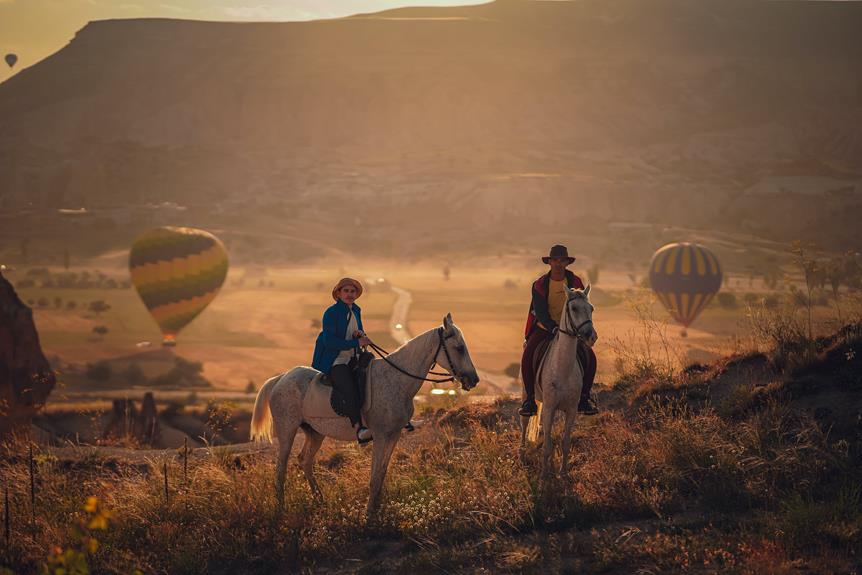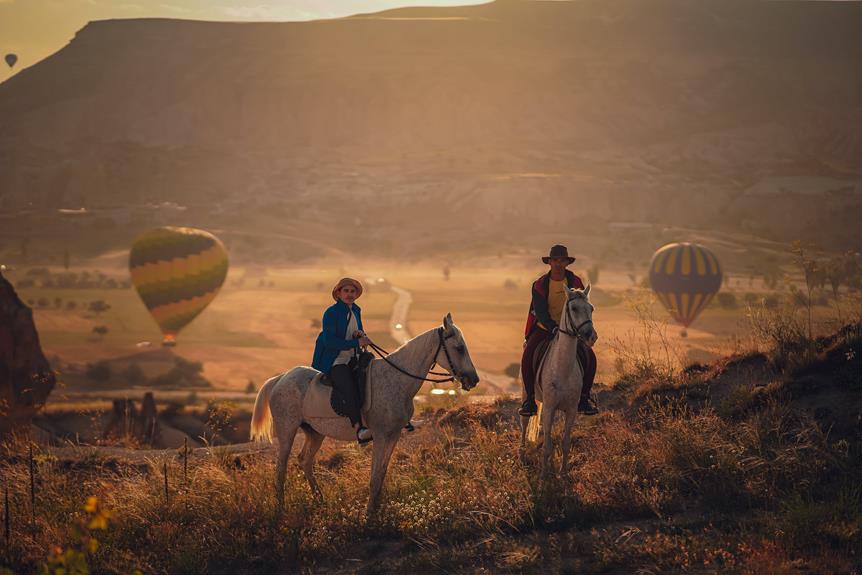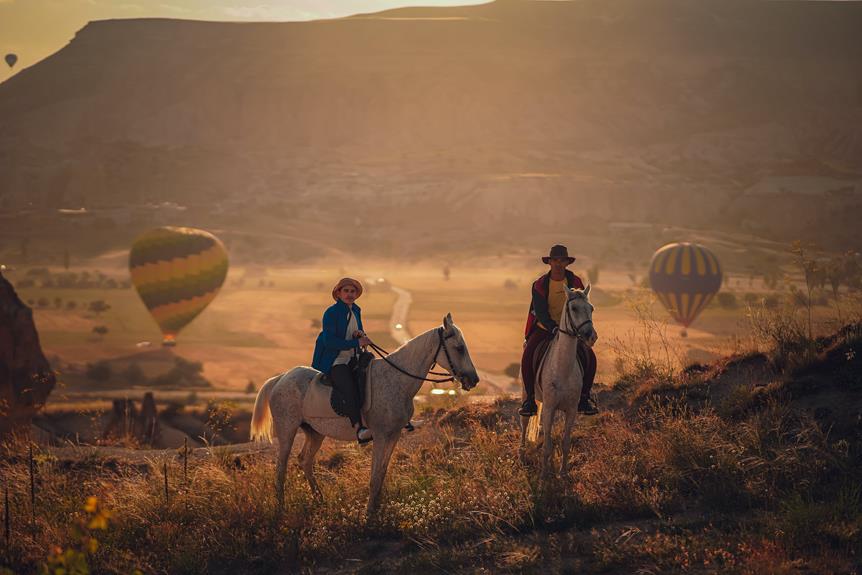So, you've come across the question of whether horses eat meat. It may seem like an absurd notion, considering their reputation as herbivores. But hold your horses, because this topic is more complex than you might think.
While it is widely accepted that horses are not carnivorous creatures, there are intriguing accounts and historical anecdotes that suggest otherwise.
So, let's saddle up and explore the intriguing world of horses and their relationship with meat.
Key Takeaways
- Horses have a herbivorous diet and their digestive system is designed for processing plants.
- Horses lack the liver function necessary to process toxins found in meat.
- Wild horses primarily graze on grasses, herbs, and other plant materials to meet their nutritional needs.
- Instances of horses consuming meat are extremely rare and usually occur out of necessity, such as when there is a lack of suitable vegetation.
Horses' Herbivorous Diet
What do horses primarily eat?
Horses have a herbivorous diet, meaning they primarily consume plant matter. Despite the occasional anecdotal instances of horses eating meat, their digestive system is specifically designed for processing plants. Unlike carnivores with shorter digestive systems for meat digestion, horses have a large and long digestive system. This system allows them to efficiently break down and extract nutrients from plant material. Horses lack the liver function necessary to process toxins found in meat, making them unsuitable for a meat-based diet.
Horses have teeth that are adapted for grinding and chewing plants. Their herbivorous teeth are flat and molar-like, unlike the sharp, pointed teeth of meat-eating mammals. To meet their energy requirements, horses need around 13,500 calories per day. They obtain these calories from various sources, including pasture grass, grain, dried hay, and sweet feed. These sources provide the necessary energy and nutrients for horses.
Additionally, horses require roughage in their diet to fulfill their essential nutrient needs.
Rare Cases of Meat Consumption
In exceptional circumstances, horses may engage in rare instances of meat consumption. While horses are primarily herbivores, there are a few exceptional cases where they may consume meat derivatives.
Here are four important facts about these rare cases of meat consumption:
- Survival in harsh climates: In some extreme environments where forage is scarce, horses may resort to consuming meat derivatives like dried fish, blood, or dried camel meat. These instances are driven by necessity rather than preference.
- Curiosity or mineral deficiencies: There are anecdotal reports of horses nibbling on meat out of curiosity or due to mineral deficiencies. However, it's important to note that these behaviors aren't a primary source of meat in their diet.
- Digestive challenges: Horses' digestive systems are designed for plant matter, lacking the necessary liver function to efficiently process meat-derived toxins. Feeding horses meat can pose health risks, potentially leading to serious conditions like colic and digestive discomfort.
- Herbivorous tendencies: Horses' natural inclination and adaptations support their herbivorous diet. Their flat teeth, used for grinding plants, and the absence of carnivorous traits like sharp canines indicate that meat consumption isn't typical for horses.
Factors Influencing Meat Consumption in Horses
Horses' meat consumption can be influenced by various factors, including their nutritional needs, historical and cultural practices, curiosity, territorial behavior, and digestive system adaptation. While horses are primarily herbivores and their digestive systems are adapted for processing plant matter, there are exceptions to this rule. In harsh climates or extreme conditions, horses may consume meat derivatives to supplement their protein and energy requirements. Additionally, in certain historical contexts, such as during war or in isolated regions, horses have been fed unconventional meat-based supplements due to scarcity of vegetation. Curiosity towards meat and nibbling on it could indicate mineral deficiencies in horses. Furthermore, horses may exhibit territorial and protective behavior, chasing and accidentally killing small animals in their surroundings, which could lead to meat consumption out of protective instinct or curiosity. However, it is important to note that meat consumption poses health risks to horses and is generally unsuitable for their digestive systems. Horse owners should be aware of these factors and ensure that their horses receive a balanced diet suitable for their herbivorous nature.
| Factors Influencing Meat Consumption in Horses | |
|---|---|
| Nutritional Needs | In harsh climates or during extreme conditions, horses may consume meat derivatives, such as dried fish or blood, to supplement their protein and energy requirements. |
| Historical and Cultural Practices | In certain historical contexts, such as during war or in isolated regions, horses have been fed unconventional meat-based supplements due to scarcity of vegetation. |
| Curiosity and Mineral Deficiency | Horses may exhibit curiosity towards meat, or nibble on it, which could indicate mineral deficiencies. |
| Territorial and Protective Behavior | Horses may chase and accidentally kill small animals in their surroundings, possibly consuming the meat out of protective instinct or curiosity. |
Historical Examples of Meat-Eating Horses
During certain historical periods and in extreme climates, horses have demonstrated their adaptability by consuming unconventional supplements, including dried fish, blood, and even camel meat.
Here are some historical examples of meat-eating horses:
- In harsh climates like Iceland, horses were fed dried fish to increase their protein intake and help them survive cold winters. This practice ensured that these horses received the necessary nutrients to maintain their health and strength.
- Tibetan horses, known for their resilience in harsh conditions, were often given a mixture of blood and grain as a supplement. This combination provided them with the necessary energy and nutrients to stay in good shape during challenging times.
- During times of war or scarcity in desert lands, horses were fed a mixture of honey, dried locusts, and even dried camel meat. This unconventional diet helped sustain these horses when other food sources were limited.
- Even famous explorer Ernest Shackleton's horse, Socks, shared in meaty meals during arctic expeditions. This ensured that the horse received the necessary nutrients and energy to endure the harsh conditions they faced.
Throughout history, horses have shown their ability to adapt to different environments and circumstances by consuming unconventional supplements. While they aren't natural meat eaters, these examples demonstrate the resourcefulness of horse owners in feeding a horse in challenging situations.
Debunking Myths: Do Wild Horses Eat Meat?
Contrary to popular belief, wild horses aren't known to consume meat as a part of their natural diet. Despite the occasional historical anecdotes of horses eating meat, it isn't a common or essential behavior for them. Horses are herbivores, with a digestive system specifically designed for processing plant matter. Their flat, molar-like teeth are ideal for grinding plants, and they lack the sharp canine teeth that meat-eating animals possess.
While wild horses may exhibit curiosity or investigate meat, it doesn't indicate a dietary need or preference. Feeding horses meat can pose health risks and isn't recommended for their nutrition.
It is important to debunk the myth that wild horses eat meat, as this misconception can lead to incorrect assumptions about their dietary requirements. Wild horses primarily graze on grasses, herbs, and other plant materials found in their habitats. Their digestive systems have evolved to efficiently extract nutrients from these sources.
Providing a well-balanced diet that includes high-quality forage and appropriate supplements is crucial for maintaining the health and well-being of these magnificent creatures. Therefore, it's essential to rely on factual information and scientific knowledge when it comes to understanding the dietary habits of wild horses and debunking the myth of them consuming meat.
Frequently Asked Questions
Is It OK for Horses to Eat Meat?
It's not okay for horses to eat meat. Nutritional implications can lead to health problems. Ethical considerations also come into play. Meat can negatively impact a horse's digestive system, causing disorders. Stick to their natural plant-based diet for optimal health.
Were Horses Ever Meat Eaters?
No, horses were not carnivorous. Over time, their diet evolved to be herbivorous. Their digestion changes allowed them to process plant-based diets efficiently. So, horses do not naturally eat meat.
Why Do Horses Eat Chicken?
Horses do not naturally eat chicken or any other meat. It is important to understand their nutritional requirements, impact on digestion, and ethical considerations. Feeding them a plant-based diet supports their overall health and well-being.
Why Is Horse Meat Forbidden?
Horse meat is forbidden because horses are herbivores with a digestive system designed for plant matter. Their teeth and lack of liver function make consuming meat risky for their health.
Conclusion
In conclusion, horses are herbivores and their natural diet consists of plants and forage. While there have been rare instances of horses consuming small amounts of meat out of necessity, it isn't a normal or healthy part of their diet.
Feeding horses meat can have negative effects on their digestive system and overall health. It's important to prioritize a balanced vegetarian diet for horses to ensure their well-being.



0 Comments